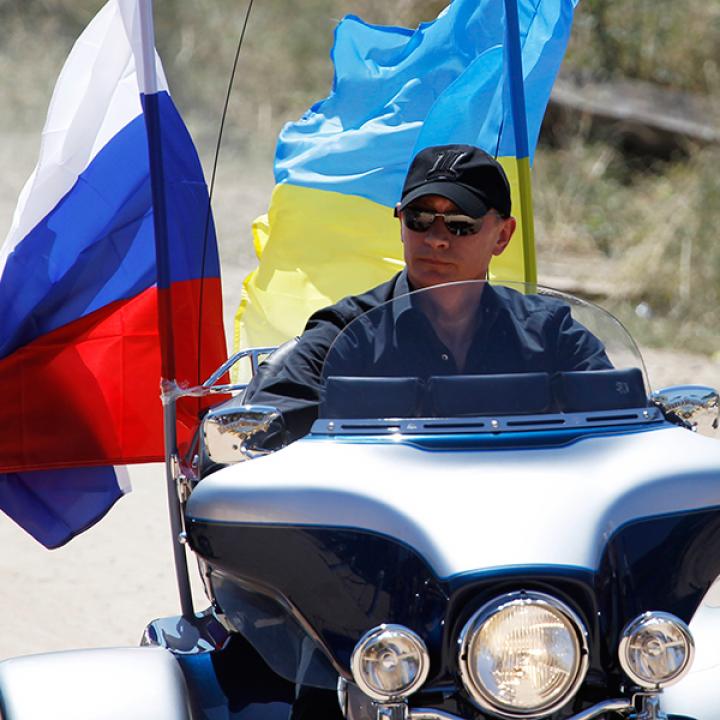
- Policy Analysis
- Articles & Op-Eds
Stop Giving Putin a Free Pass to Europe’s Backyard
Also published in Newsweek

Simply waiting for Russia to decline has not prevented the Kremlin's aggressive and destabilizing behavior in various regions, and may even have encouraged it.
Western powers have effectively given Vladimir Putin a free pass in Europe’s backyard: the Balkans and the Middle East. The ramifications of letting the Kremlin advance in the regions at the southeastern fringes of Europe may be subtle, but they are also wide-ranging and dangerous.
The Balkans region straddles East and West, Islam and Christianity. It is one of Europe’s most vulnerable fronts. Nineteenth-century German chancellor Otto von Bismarck’s assertion that a major conflict would erupt from “some damn foolish thing in the Balkans” was not just a prophetic statement on the First World War, but also a reminder that the region has deceptive import. The Middle East, meanwhile, is key to Putin’s global calculus. For one thing, a position there allows Russia to undermine Europe precisely where it is most vulnerable—through the Mediterranean Sea.
The Balkans’ geostrategic location—as well as the Balkan Stream pipeline, which will serve Southeastern Europe—is important to the Kremlin’s promotion of energy as the primary economic tool of Russian influence. Moscow has for years been looking to gain a foothold in the region and has tested its “hybrid” capabilities for influencing governments with impunity. For instance, in Montenegro, a country significant for Russia because of its access to the Adriatic Sea, Moscow was allegedly involved in a coup attempt against the then pro-Western government in 2016, the year before the country joined NATO. Russia’s interference in Montenegro to this day remains strong.
Moscow also meddles in other countries in the Balkans as part of a larger bid to undermine the West. Russia has funded troll factories to target the presidential campaign in North Macedonia, and tried to influence its name-change referendum in 2018, a prerequisite measure for the country’s NATO membership. Similarly, Russia is using its close relationship with Serbia to undermine the EU. In Croatia, the Kremlin has been investing in critical sectors such as gas, and exploiting internal conflicts in neighboring Albania by fomenting political divisions. And in Bosnia and Herzegovina, Russian disinformation campaigns have sown ethnic and religious discord, and encouraged the secession of ethnic Serb regions from the state.
Putin, like his Soviet and czarist predecessors, similarly views the Middle East as a key arena for competition with the West, a vulnerable southern underbelly to secure and gain great power recognition. To be sure, the U.S. remains engaged in the region, but is deprioritizing it in favor of competition with China. In Syria, Russia now has a permanent military presence on the Eastern Mediterranean for at least the next 49 years, and is using this position to project power throughout the region and into Europe’s south, as well as deeper into Africa. It is no accident that after Syria, Putin’s next big move in the Middle East was to Libya, another country on the Eastern Mediterranean—and an oil-rich entry point towards southern Europe. Moscow’s military presence puts it in a better position to undermine NATO, threaten Europe with more refugee crises and push for greater influence in a region that already has come to perceive Russia, even if begrudgingly, as a power that stands by its partners and can serve as a mediator.
Moscow not only continues to move into Syria but to converge with Iran and its proxies. If this trend holds, Moscow (and Tehran) will ultimately have the final word on Syria’s future, which will lead to a Russia-Iran-Assad nexus that could in time greatly limit American influence. Such an alliance could also allow Russia more access to the Persian Gulf, one of the world’s most strategic waterways.
As Europe remains divided and the U.S. distracted, Putin keeps his eyes on the big picture as a means to stay in power. It is no accident that, over the years, he has become increasingly involved in Afghanistan and maintains control in the South Caucasus—all located in Russia’s vulnerable south. Moreover, as Putin continues to recoil from Western “decadence and immorality," there is also a cultural dimension to his south and eastward focus.
Of course, the West should keep its attention on the familiar fronts of Putin’s aggression—Ukraine, Moldova and Belarus. But it cannot afford to ignore other vulnerable regions and more subtle Russian tactics, or wait for Russia to decline. Years of these trends had not prevented aggressive and destabilizing Kremlin behavior, and perhaps has even encouraged it. Putin’s aims have a global dimension: for Russia to win, and the U.S.-led global order has to erode. It’s time for a unified Russia strategy that looks at multiple fronts. The alternative—letting Russia’s actions go unchecked in key strategic regions—will have serious consequences.
Anna Borshchevskaya is a senior fellow at The Washington Institute and author of the upcoming book Putin’s War in Syria: Russian Foreign Policy and the Price of America’s Absence. Ivana Strander is a Jeane Kirkpatrick Fellow at the American Enterprise Institute. This article was originally published on the Newsweek website.



